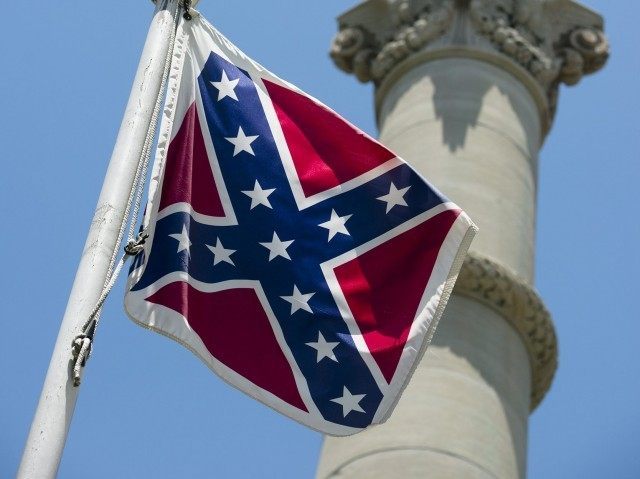I really don’t want to put a picture of the Confederate battle flag on my Twitter profile. For me, it represents political values that are more or less the opposite of mine.
But for a while yesterday, when a perfectly reasonable measure in South Carolina seemed to morph into nationwide panic that lumped history geeks in with segregationists, I began reluctantly searching the internet for the best flag image to put on my profile. In moments of runaway censorship, contributing to the Streisand Effect is every liberal’s duty.
I had very few qualms on Wednesday, when I heard that the flag was being taken down from state capitols. Those are public buildings, and flying the confederate flag on a state property is by definition a political statement. It’s a sign that the flag has the approval of the government and that it represents the people of the state.
I’m aware that it has some very unlikely supporters, but that’s beside the point. A flag is meant to represent the people, and it’s clear that significant sections of the public feel very strongly that the flag does not represent them.
It was on Thursday when things got complicated. Unprompted, historical Civil War sites like Gettysburg announced they would be removing flags. Walmart, Amazon, Sears and eBay announced they would stop selling the flag as well. It was no longer a case of withdrawing state endorsement of the flag by removing it from government buildings — now the choice of private citizens was under attack.
Private citizens buy the flag for all manner of reasons. They may buy it because they’re white supremacists, and they think it symbolizes white supremacism. They may buy it because they’re rebels, and they think it symbolizes rebellion. They may buy it because they’re historical reenactors, or just history aficionados. It’s disingenuous to insist that everyone who purchases the flag must be motivated by the worst possible intentions — or, more obnoxiously, that intentions don’t matter.
But corporate America doesn’t think in such nuanced terms, and as for a moment, it seemed as if the bandwagon of corporate censorship would turn into a tidal wave that would sweep all before it. Google, the internet’s ubiquitous search engine, announced it would no longer allow users to conduct shopping searches for the flag.
This was an extraordinary act of corporate censorship from a company that holds a virtual monopoly on web searches. With no one mounting an organised opposition, I was ready to make my Twitter profile look extremely uncool.
Then I heard that Apple had censored a number of historical Civil War video games from its store due to the presence of the battle flag.
Woops. Bad move.
Not all Breitbart readers will have followed our reporting on the #GamerGate controversy, but trust me when I say that there is no more fearsome and formidable force against corporate censorship on the internet than gamers. Before long, gamers, game developers, and even games journalists were up in arms about the attack on Civil War-themed games — all of which appeared to be nothing more than innocent historical simulators. Apple was about to encounter a stonewall.
https://twitter.com/Grummz/status/614198963449692160
Things got worse for Apple after the studio behind Ultimate General: Gettysburg, one of the newly-banned games, released a statement addressing Apple’s decision. It was exceedingly gracious, wishing Apple well in their campaign against racism in America, but politey refusing entreaties to remove the flag from their games.
While Game Labs acknowledged the controversy surrounding the flag, they emphasized that their goal was to create “the most accurate, historical, playable reference to the Battle of Gettysburg”. Twisting the knife a little, they highlighted that their game was used as a resource in classrooms by history teachers, adding that historical movies like Schindler’s List did not remove uncomfortable imagery.
Game Labs’ demonstration of principle mixed with graciousness left defenders of Apple’s decision looking like, well… douchebags. It turns out you really can “weaponize nice.” (Gamergate will get the joke).
Heartened by the growing backlash, I decided it was not yet necessary to go full Dixie on my Twitter profile. Despite being a Breitbart writer, I could salvage at least some of my liberal cred.
I was even more heartened this morning when I learned that Apple had opened up talks with developers to restore some Civil War games to their store. In a statement, Apple clarified that they only wanted to ban instances of the Confederate flag that were “offensive or mean-spirited.” Of course, that begs the question of why they banned historical sims in the first place, but it was nice to see such a rapid U-turn from Apple. The lesson is clear: don’t mess with gamers.
It’s a small victory, of course. The banning of confederate flags across multiple online retailers is still a staggering act of corporate censorship and raises important questions about the unchecked power of tech giants like Amazon, Apple, and Google. (The latter is particularly troubling, as it is actually censoring search results).
But it’s heartening that our modern age is not solely characterized by panic, censorship, and corporate virtue-signalling. Gamers are, after all, a very modern subculture. But their nuanced, principled, and above all stubborn resistance to the mainstream panics of the day, whether they concern misogyny or racism, makes them not just a subculture, but a true counterculture.
Follow Allum Bokhari @LibertarianBlue on Twitter.

COMMENTS
Please let us know if you're having issues with commenting.